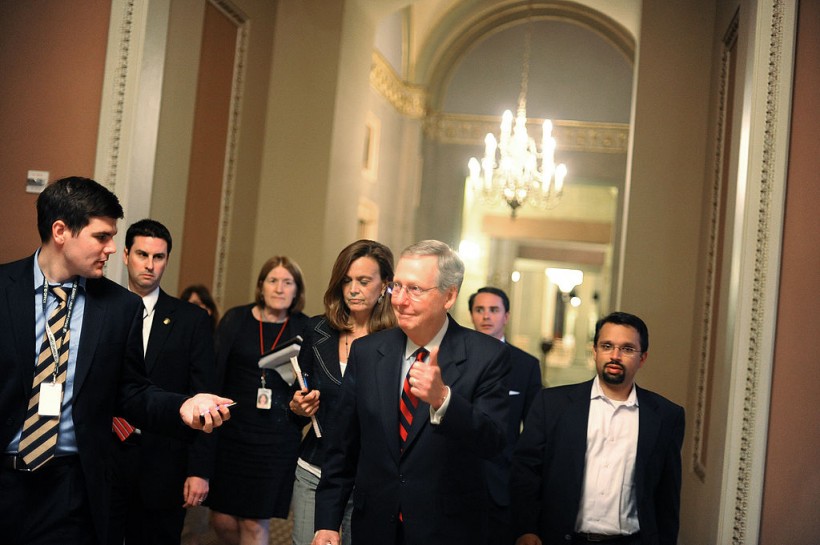
(Photo : Photo by Astrid Riecken/Getty Images)
WASHINGTON, DC - JULY 31: U.S. Senate Minority Leader Sen. Mitch McConnell (R-KY) gives a thumbs up when asked whether a deal has been reached regarding the ongoing debate on the national debt reduction on July 31, 2011 in Washington, DC. As the United States approaches the possibility of a default, the congressional leaders and the White House try to reach an agreement on measures to lift the debt ceiling.
The Senate approved new legislation on Thursday to pave the way through the last major hurdle in raising the debt ceiling of the United States federal government in an attempt to prevent a potential default.
The situation came after 14 Republican lawmakers joined all Democratic officials in effectively ending the GOP's months-long blockade of debt-limit legislation. The support from the Republicans allowed the bill to advance in the 50-50 Senate. Later, the legislation passed by a similar margin, going 59-35, with 10 GOP officials joining Democrats for final passage.
Debt Ceiling Increase
Now, United States President Joe Biden is expected to immediately sign the bill into law, establishing a one-time fast-track process for Congress to increase the country's borrowing limit by a set amount. However, the amount that the country's debt limit will be raised is still undetermined.
The passage of the bill would also make way for a separate vote to raise the debt limit by up to $2.5 trillion, which is expected early next week. The situation gives Congress the opportunity to avoid a fiscal crisis as there is very little time to spare, the New York Times reported.
The bill is a result of a deal between Senate Minority Leader Mitch McConnell and Majority Leader Chuck Schumer. McConnell's decision to strike an agreement with Democrats has garnered scrutiny among GOP members who have criticized his approach to the issue.
Read Also: Jussie Smollett Attorney Says Actor Plans To Appeal Guilty Verdict in Alleged Fake Hate Crime Scheme
The 14 Republicans that voted in support of Democrats include Sens. John Thune, John Barrasso, Roy Blunt, and Joni Ernst. Additionally, Sens. Thom Tillis, Richard Burr, John Cornyn, Lisa Murkowski, Shelley Moore Capito, Roger Wicker, Susan Collins, Rob Portman, and Mitt Romney joined McConnell's deal.
The deal with the two senate leaders uses a bill that prevents Medicare cuts as a vehicle for language to allow the Senate to raise the country's debt limit. The bill will allow Congress to increase the debt limit without resorting to a filibuster in the Senate. The situation gives Republicans the opportunity to vote against the actual increase of the debt limit when it comes to the floor, which is expected to be next week if they choose to do so, Fox News reported.
Senate Deal
Earlier this year, the majority of Senate Republicans signed a letter that said they would refuse to vote to increase the government's debt ceiling in opposition to Democrats' partisan spending. GOP members argued that the opposing party should use reconciliation to raise the debt ceiling while avoiding the filibuster.
However, Senate Democrats did not budge, leading to a long-running standoff in October as both parties were threatening a potential default of the federal government. Later, McConnell caved and supported a temporary debt limit increase that will last until the end of this month. However, the minority leader said that Republicans will not vote to increase the debt limit a second time.
But the recent deal with McConnell and Schumer resulted in Republicans saying that it accomplished their goals of making Democrats raise the limit on their own. However, some GOP members who voted yes on the bill on Thursday also expressed their frustration on the bill, Fox Business reported.
Related Article: Biden Administration's Vaccine Mandate For Private Sector Faces Opposition in Senate, With McConnell Calling it a 'Blatant Overreach'








